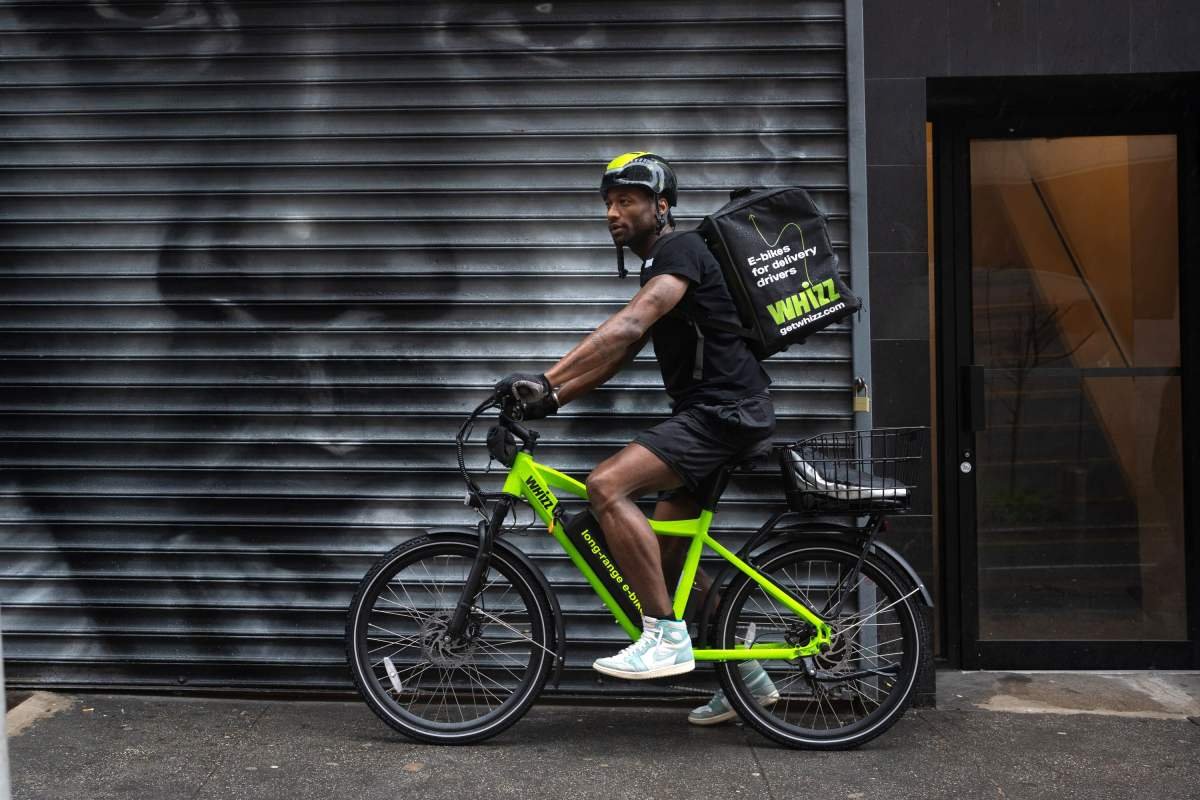New York City, known for its hustle and bustle, is also home to over 60,000 gig delivery workers. However, the city has been facing a dilemma with the use of cheap, uncertified e-bikes that have caused battery fires and raised safety concerns. To address this issue, the city has implemented stricter regulations, making it challenging for some e-bike companies to operate. But for e-bike subscription startup Whizz, it sees this as an opportunity rather than a problem.
“I think the market is evolving from a Wild West state to a more mature one,” stated Mike Peregudov, CEO and co-founder of Whizz, in an interview with TechCrunch. “We are fortunate to be here during this transition, as it will become increasingly difficult for new players to enter the market once regulations are in place.”
Based in New York, Whizz offers a monthly subscription for gig workers to have access to safe and high-quality e-bikes at an affordable price range of $139 to $149. The startup’s official partners in NYC, Grubhub and DoorDash, provide discounts of up to 15% for their couriers to access subscriptions or rent-to-own schemes. These subscriptions also include services, maintenance, and protection against theft.
Founded in 2022, Whizz recently raised $12 million to further improve their product offerings. The startup plans to expand its presence beyond New York and into cities like Boston, Chicago, Miami, Philadelphia, and Washington, D.C. Additionally, Whizz aims to manage 40,000 e-bikes in NYC over the next three years, a significant increase from its current deployment of 2,500 e-bikes in NYC and Jersey City.
The e-bike subscription market in the U.S. is still relatively new, and Whizz’s main competitor is Zoomo, an Australian startup that also operates in NYC and a few European cities. However, Zoomo’s subscription costs an average of $49 per week or nearly $200 per month. In comparison, Uber Eats couriers can access Whizz’s subscription at a lower price point of $24 per week or under $100 per month. Furthermore, Zoomo also caters to enterprise customers by providing entire fleets.
Whizz’s co-founders, who all came from Russia, moved to New York a few years ago after successfully launching and selling their subscription-based businesses. Peregudov’s previous venture, Paritya Edy, a meal-kit delivery service, was acquired by Yandex in 2019 for $25 million. His co-founders, Alex Mironov, Ksenia Proka, and Artem Serbovka, sold their e-bike subscription platform, Moy Device, to a private equity firm in Russia.
“We never raised hundreds of millions of dollars, and I think that could be a risky move for this type of business,” Peregudov mentioned. “We’ve seen companies raise a significant amount of funds and then try to rush in with heavy expansion. This type of business requires a different approach, and we are focused on keeping our operations lean and efficient.”
One of the significant factors contributing to Whizz’s success is its proprietary software, which helps streamline operations and improve unit economics. This ERP system provides analytics on various aspects, such as repair time, IoT usage for warehouse logistics, and revenue and payment management. Additionally, it also manages bike and customer information and can remotely control parts of the bikes to prevent theft.
“Our software includes an internal scoring model, which ensures that we rent our bikes to responsible individuals,” Peregudov shared. “This scoring system incorporates AI technology and considers over 50 parameters, similar to a bank credit score. Most of our customers are immigrants, and our system is one of the few that can assess their credit risk since banks do not cater to this demographic.”
Whizz’s e-bikes are specifically designed to meet the needs of food delivery workers and can travel up to 1,000 miles per month. The large batteries used in their bikes allow couriers to cover more distance and earn more income. The batteries are UL certified and built with Samsung cells to ensure safety and reliability. Moreover, Whizz has five hubs located strategically around the city, allowing couriers to pick up bikes, repair, or replace them within 30 minutes or less. The startup offers customer service in six languages, including English, Spanish, French, Turkish, Arabic, and Russian.
However, Whizz’s future plans could face a significant setback as its bikes and batteries are currently assembled in China. With the Biden administration’s recent announcement of tariffs on Chinese imports, e-bikes and batteries will be subject to a 25% price increase. Peregudov remains optimistic and states that they own their intellectual property and can shift production to countries like India or Vietnam if needed.
The success of Whizz’s business model in the U.S. market remains to be seen. Zoomo, its main competitor, has a strong presence in Europe, but its market share in the U.S. has gradually reduced, with the startup exiting from San Francisco in 2022. Whizz’s expansion strategy includes expanding along the East Coast before expanding nationwide. Additionally, it plans to introduce new form factors to cater to a broader range of delivery workers.
Sergey Toporov, a partner at Leta Capital, believes in Whizz’s potential and invested in the startup due to its impressive contribution margin, even at a small scale. As Leta mainly supports software companies, Whizz’s ERP system played a significant role in their decision to invest. The startup’s ultimate goal is to become a nationwide player, and they continue to leverage their software and efficient operations to achieve profitability in the near future.








